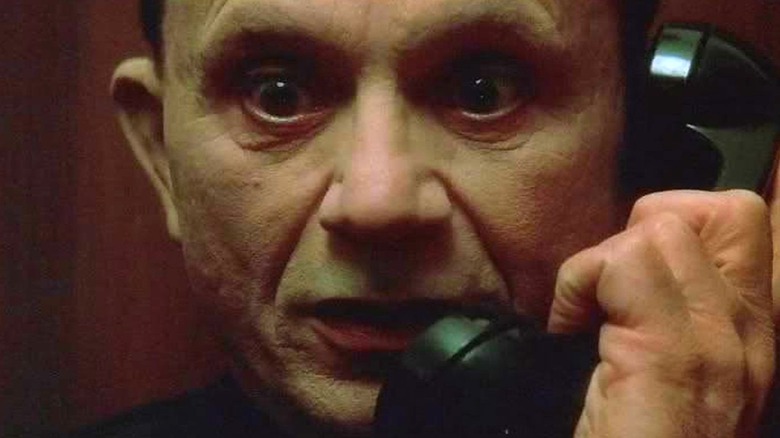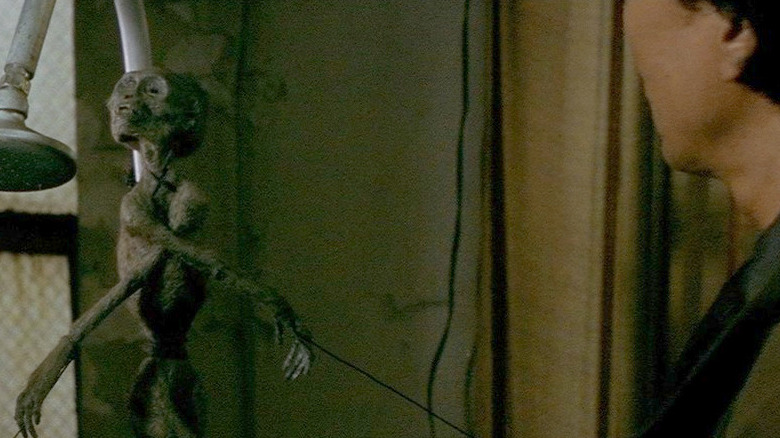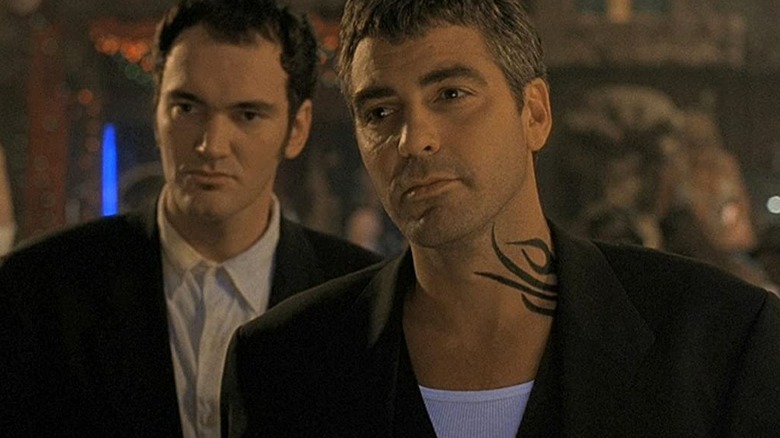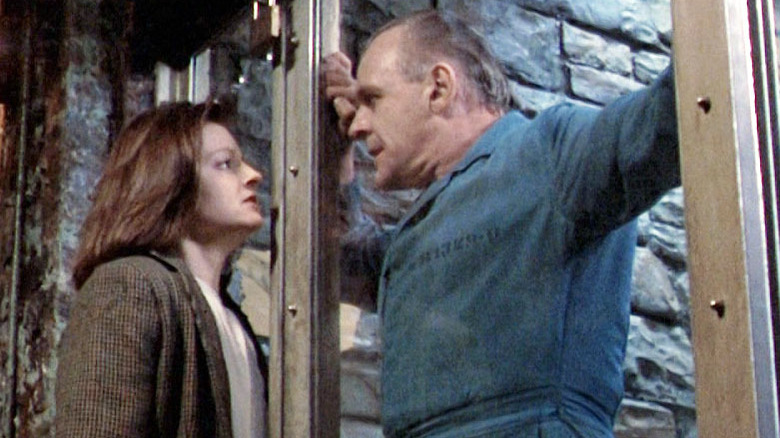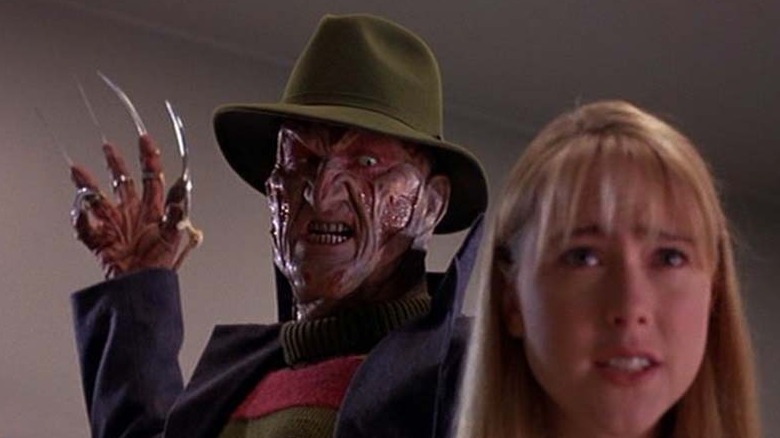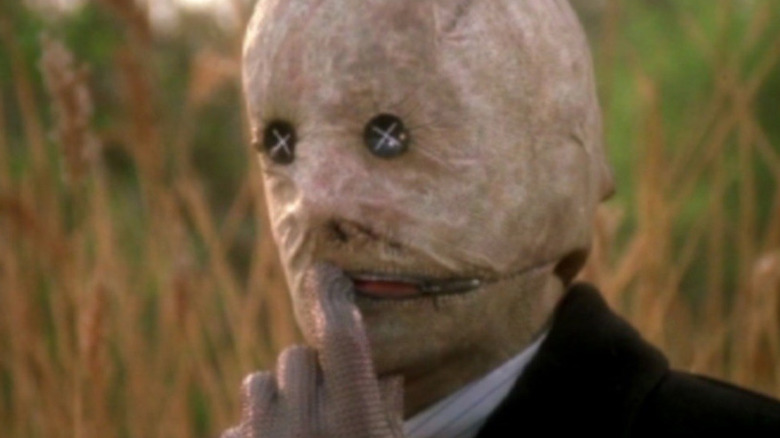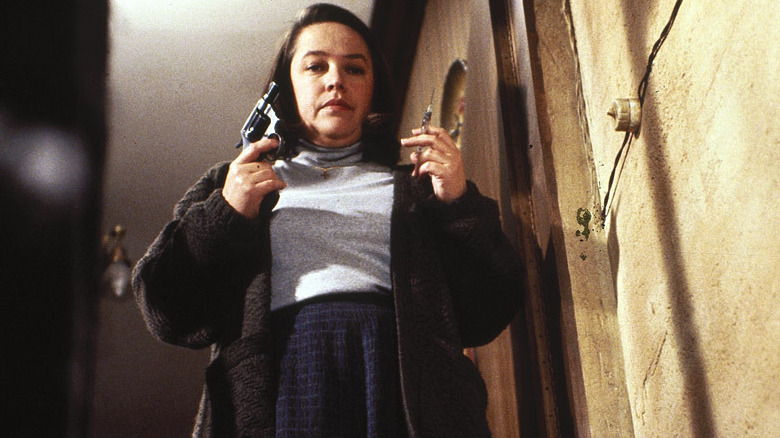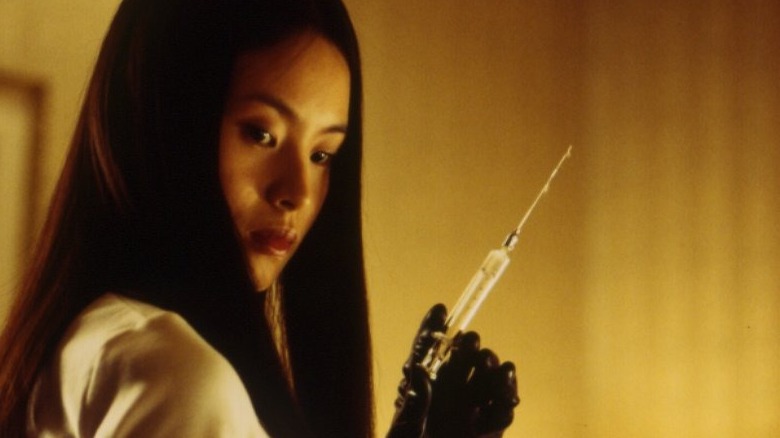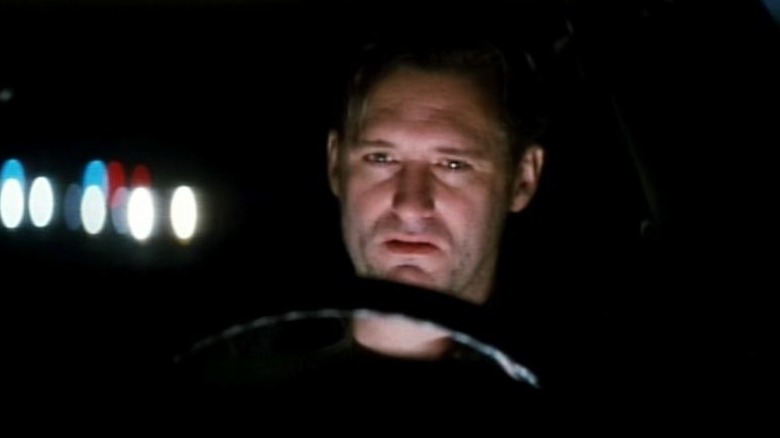'90s Horror Movies You Need To Watch
The '90s was a significant decade for the horror movie genre. This ten-year period was one in which filmmakers were constantly pushing the envelope on what could be shown (or even implied) through the screen to elicit a sense of dread, panic, and terror.
Giving a well-deserved exception to a handful of contemporary films (Jordan Peele's "Get Out" and Ari Aster's "Hereditary," for example, still haunt many viewers), it seems evident that the current age of horror moviemaking has shifted priority to producing reboots and franchises versus developing more intriguing and fear-inducing experiments that evolve the moviegoing experience. This discrepancy has classic genre fans clawing for the tiniest bit of horror nostalgia. So if you have an affinity for the frightening or a penchant for the creepy, you're in luck! Oil up your chainsaws and sharpen those bladed work gloves, because these are some '90s horror movies you need to watch!
Cure
"Cure" is a Japanese film that follows Detective Kenichi Takabe (Kōji Yakusho), who is investigating a series of brutal murders where an "X" is carved into each of the victims' necks. Sounds a bit cliché, right? "What's the catch?" you may be wondering. Well, this film isn't too concerned with who committed the crimes, but rather with the bizarre circumstances surrounding them. Detective Takabe discovers that, despite the eerie similarities in their execution, each victim was slain by a separate individual — all of whom have no history of violence nor any recollection of the gruesome crimes they committed.
Director Kiyoshi Kurosawa constructs a bleak and illusive atmosphere that correlates to the unsettling psychoanalytical bond between Takabe and the hypnotic "killer," using the horror genre like a trap to ensnare the viewer in an experience of self-exploration. Bong Joon-ho, acclaimed director of "Parasite" (2019) and "Memories of Murder" (2003), has cited the film as having had "the biggest impact on my own personal view of cinema." Littered with ambiguity and thought-provoking social critiques, this film will stay with you long after the puzzling final scene.
From Dusk Till Dawn
Two bank-robbing brothers (portrayed by George Clooney and renowned director Quentin Tarantino) have kidnapped their hostages, a devoutly religious family, at gunpoint. The family, consisting of a pastor (Harvey Keitel) and his two kids (Juliette Lewis and Ernest Liu), are forced to join the unstable criminals on their impromptu getaway to Mexico in order to evade arrest. The group stops for a little R&R at an all-night strip club only to realize ... The place is run by vampires!
Directed by Robert Rodriguez ("Sin City," 2005), with the script duties handled by Tarantino himself, "From Dusk Till Dawn" is steeped in wit, parody, and offbeat humor. Utilizing Tarantino's trademark snappy dialogue as well as some make-up and special effects tricks (à la Sam Raimi's cult-classic "The Evil Dead"), this blood-and-gore extravaganza is an imaginative take on the vampire sub-genre that'll keep you glued to the edge of your seat.
The Silence of the Lambs
Jodie Foster, in arguably her most iconic role, stars in "The Silence of the Lambs" as Clarice Starling, an FBI trainee who gets assigned to interview the imprisoned psychiatrist-turned-cannibal Dr. Hannibal Lecter (played by Sir Anthony Hopkins) to seek help from an expert in the case of "Buffalo Bill," a serial killer (portrayed by Ted Levine) who flays his victims.
"The Silence of the Lambs," based on the 1988 novel by Thomas Harris, is notorious for being one of only three films in history to win Oscars in all five major award categories in its year of release, as well as the only film of the three considered to fall under the "horror" genre. Hopkins gives us a Hannibal who's incredibly well-mannered (in a very creepy sort of way), but behind that eerie smile, there's a monster just waiting to pounce. Jodie Foster's interpretation of Clarice Starling is more low-profile but possesses an understated brilliance. If you've never seen "The Silence of the Lambs," prepare for a twisted, disturbing psychological horror that builds a looming sense of dread until it finally culminates in a nail-biting finale.
Wes Craven's New Nightmare
In this sequel to the original 1984 film "A Nightmare on Elm Street," director Wes Craven makes his long-awaited return to the franchise. This installment adds a meta layer to the nightmare-based mythology by bringing the Freddy Krueger villain out of his own films and into the "real world." Heather Langenkamp (the star of the original film, playing a fictionalized version of herself) is now married with a young son. Following tried-and-true horror tropes, Heather (like her "Elm Street" counterpart, Nancy) is forced to confront the supernatural entity that has escaped its fictitious world. She must act quickly in order to save her loved ones and finally rid herself of evil in order to live (and sleep) in peace off-screen. The result is a movie that's brilliantly aware of the franchise's history and foreshadows the arrival of meta horror films like Craven's own "Scream" and "The Cabin in the Woods." It also took a slasher villain who'd been turned into a joke and made him legitimately scary again.
Nightbreed
Aaron Boone (Craig Sheffer) is tormented by visions of monstrous, graveyard-dwelling creatures in the film "Nightbreed." He is falsely convinced by his therapist (David Cronenberg) that his frequent dreams are linked to a recent spate of mutilation murders in the area. Boone eventually finds refuge in an abandoned cemetery called Midian among a "tribe" of monsters and outcasts known as the Nightbreed who are hiding from humanity.
This film, though not without its flaws, actually blends together elements of several horror sub-genres quite well, creating something truly bizarre and entertaining from start to finish. And in an interesting twist, the monsters who look so scary aren't really evil. On the flip side, we soon realize that in this world of horror, perhaps humans are the ones who should be truly feared.
Unique in its concept and creatures, this story's ideas are quite grand. After all, it comes from the mind of Clive Barker, the man who brought us "Hellraiser" and "Candyman." Complete with a fantastic Danny Elfman score, "Nightbreed" is an underrated '90s gem that deserves a little love.
Misery
Based on the Stephen King Novel, "Misery" follows Paul Sheldon (James Caan), the bestselling author of a popular romance series starring his heroine Misery Chastain. A horrible accident finds Paul fighting for survival after his car slides off the road. When he's found by Annie Wilkes (Kathy Bates), Paul thinks he is lucky to be alive. Unfortunately, Annie is Paul's number one fan — and she doesn't like what he has cooked up for her favorite in his next novel. Now Paul must write his way out of her clutches ... and along the way, he learns the true meaning of misery.
While James Caan anchors the film with a fantastic, sympathetic performance as Paul, Kathy Bates (in a role that won her an Academy Award) is obviously the star of this film. She completely gives herself to the character and expertly plays Annie's goofy glee and horrific turns. The story is a parable about horrific obsession, but it's also a story about how fans relate, sometimes unhealthily, to celebrities who live their lives in public — a phenomenon that is increasingly more commonplace for everyday people.
Audition
Seven years after losing his wife to cancer, a film producer named Shigeharu Aoyama (Ryo Ishibashi) is urged by his son to remarry. After giving it some thought, Aoyama, with the help of his friend, stages a phony audition to meet a potential new partner. After interviewing several women, Aoyama becomes interested in a girl named Asami (Eihi Shiina). Asami is modest, classy, pretty, a trained dancer — and, apparently, available.
This adaptation of Ryu Murakami's novel is creatively reworked from a script by Daisuke Tengan and was a breakthrough film for director Takashi Miike. With terrifying dream sequences of the painful and sadistic, "Audition" is undeniably unsettling, but not with the sole intention to scare its audiences. The true purpose is something very different that ties to the film's two protagonists. It takes sexual tensions to a hallucinatory extreme and features a climax that left many audiences crawling to the exits.
Lost Highway
David Lynch's "Lost Highway" is ... unusually bizarre, even for him. The story follows a musician named Fred (Bill Pullman) who suddenly becomes a different man (played by Balthazar Getty) after (maybe) murdering his wife (Patricia Arquette). Viewing this film feels like a meticulously orchestrated trip-stumble-and-fall into a black hole of eeriness.
The most terrifying parts of the movie have to be the ones featuring the creepy, time-traveling partygoer known as the Mystery Man (played by Robert Blake to skin-crawling effect): You can only wish he had more scenes. The soundtrack keeps the audience on edge (to the point that an innocuous telephone ring can make you flinch) while the camerawork, with its distorted visuals and unconventional angles, effectively creates unease. Drawing on many of noir's most familiar themes — the crumbling of a guilty psyche, the distrust between men and women, and the erotic allure of the dark side — "Lost Highway" brazenly deconstructs noir-horror and conventional narrative, then reconfigures it all as incongruous cinematic artistry.
